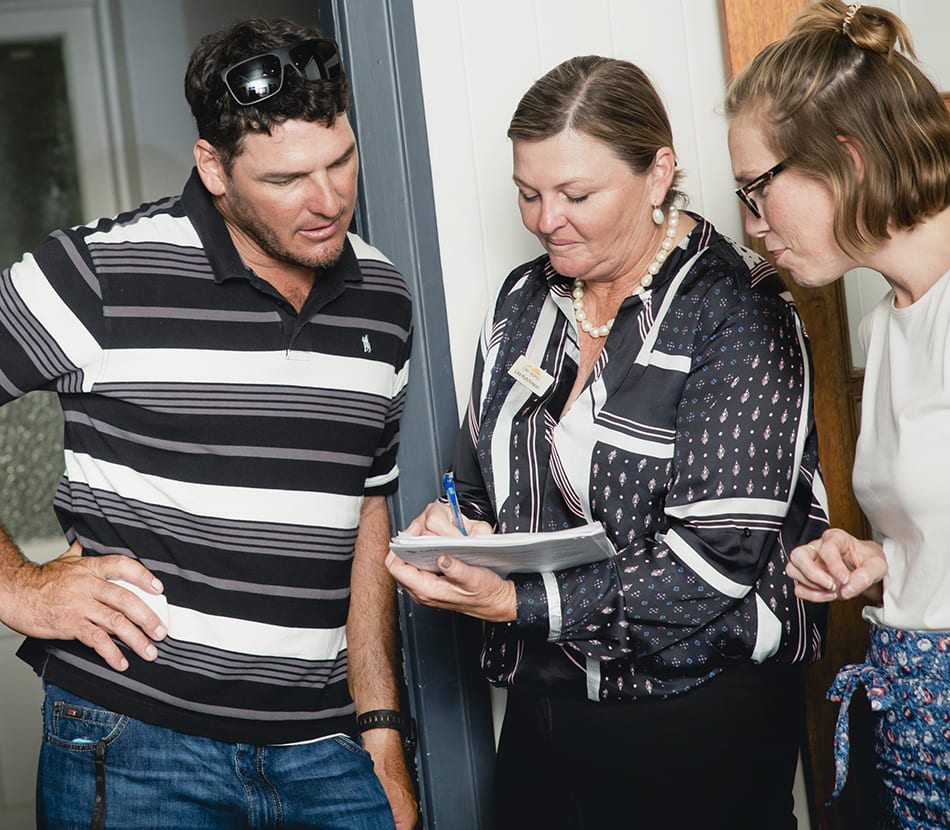
COLLECTIVE THINKING… Working with sheets of butchers’ paper are (from left): Glenlea Downs grazier Peter Anderson, Mt Pleasant Station grazier and Landholders Driving Change Steering Panel member Garlone Moulin, and Glenalpine Station grazier Leanne O’Sullivan.
Grazier response was heard
LAST year, following consultation with graziers in the BBB, the LDC submitted a response to the draft regulations on behalf of the grazier representatives on the project panel.
The standards will be staged across reef regions during three years, beginning with the Burdekin which began on December 1 starting with record-keeping requirements. OGBR representatives visited Bowen last year to inform the grazing community of this amendment.
Earlier this year representatives from the Queensland Government’s Office of the Great Barrier Reef and Department of Environment and Science and local graziers met in Bowen to discuss the revised grazing minimum standards that will apply to commercially productive beef cattle grazing properties in the Great Barrier Reef catchment.
The reef regulations were passed in parliament in September.
The LDC has made a commitment to provide information about the regulations to all landholders in the Burdekin region, including the BBB.
If you want more information, please contact an LDC team member.
Reef regulations information a ‘must-read’
THE Queensland Government has provided LDC with Reef protection regulations information for Burdekin graziers. It’s a must read. If you have any questions, contact a LDC team member.
New Queensland Government regulations to drive improved water quality and help protect the Great Barrier Reef are expected come into effect on 1 December 2019.
Under these new Reef protection regulations, all commercial graziers in the Burdekin will be required to keep general records, for example of fertilisers applied to land, from 1 December 2019.
Further, in 12 months’ time, from 1 December 2020, Burdekin commercial graziers will also be required to comply with minimum practice agricultural standards.
These minimum practice agricultural standards focus on retaining and improving ground cover and land condition to minimise soil loss. They do not mandate any particular action or measures. Instead commercial graziers will be able to determine their actions to retain or improve land condition.
Under the regulations, commercial graziers will need to take action where land is in poor or degraded condition. Land condition is measured by the amount of ground cover at 30 September each year. On paddocks where ground cover is less than 50 per cent, land is considered to be in poor condition and less than 20 per cent is considered degraded condition.
However, it is recognised that:
- For some land types it may not be possible to achieve 50 per cent ground cover at 30 September each year even when taking all reasonable steps.
- It may be impractical and cost prohibitive to improve some areas of very degraded land, e.g. severe gullying or scalded areas. If so, measures must be taken to prevent these areas from further degrading or expanding.
- Drought conditions will impact on the ability to meet or address the requirements.
The Queensland Government is currently holding drop-in information sessions for producers across the reef regions. Information on the drop-in sessions’ dates and locations are available at www.qld.gov.au/ReefRegulations.
Online information is also available at www.qld.gov.au/ReefRegulations including:
- Why are regulations required?
- What are the requirements?
- What records do I need to keep?
- What minimum practice agricultural standards do I need to comply with?
- What about other requirements for records about agricultural chemicals?
- Are best management practice accredited producers compliant with the new regulations?
- What support is available?
Reef regulation information packs can also be ordered by producers in print and electronic formats.
Packs can be requested via:
- Online www.qld.gov.au/ReefRegulations
- Email officeofthegbr@des.qld.gov.au
- Phone 13 QGOV (13 74 68)



